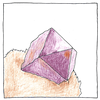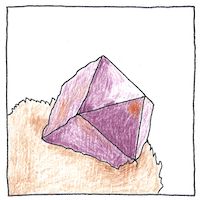Bertram Boltwood
geology

|
Dating rocks
Christian scholars thought the earth had been created in 4004 BCE. Scottish and British geologists gradually pushed this date back in time. Bertram Boltwood, who suggested that uranium eventually decays into lead, noted that as a rock ages its ratio of uranium to lead would decrease, and so he become the first person to date rocks. He tested different rocks and found some were 2200 million years old, which isn’t any longer the oldest rock. The oldest known Earth rock is a zircon crystal that formed 4.4 billion years ago.
Zircon clocks
When a zircon crystal forms uranium atoms may replace zirconium atoms but no lead atoms fit in the crystalline structure. At this point the uranium is sealed into the crystal. Uranium-235, decaying to lead-207, has a half-life of 700 million years and uranium-238, decaying to lead-206, has a half-life of 4.5 billion years, so each sample provides two clocks, a built-in cross-check to correct for loss of lead.
A beginning
For those whose dislike of infinity is unquestioned, yes, the earth had a beginning; therefore, and why not, let’s say the universe had a beginning, too, without being too precise about what we mean by universe. If we cannot see, if we cannot date anything farther away, or further back in time, look how easily our “at least” starts to look like an absolute beginning.



The Jhomon Sugi tree of Yakushima in Japan, dated by counting tree rings or by radiocarbon dating, could be 7,200 years old. This is 1/625,000th of the duration of the earth.
See also in The book of science:
Readings in wikipedia: